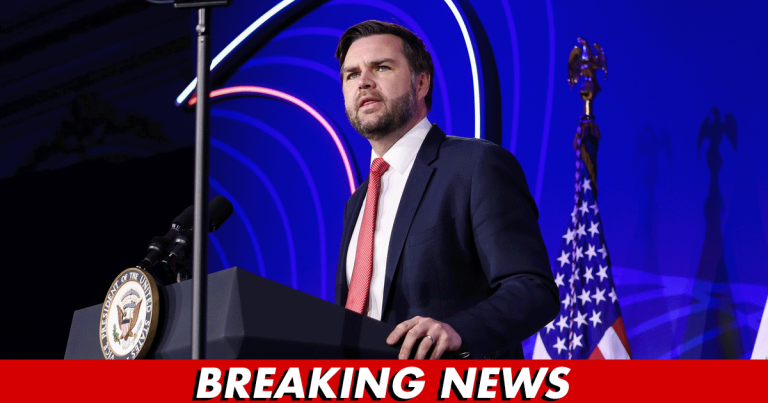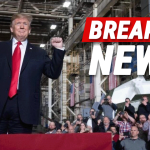
Another day, another Republican standoff. President Trump has the vision. But do congressional Republicans have the backbone to help deliver it? With the economy wobbling between recovery and relapse, Trump’s America First playbook isn’t some mystery: confront economic freeloaders, revive U.S. industry, and finally protect the American worker. It’s bold. But bold plans need backup.
Turns out, not all Republicans showed up to do their jobs on Capitol Hill. Democrats have already started throwing wrenches into one of Trump’s signature economic strategies—a tough set of tariffs aimed at course-correcting a country battered by decades of globalist policy. And in one nail-biting vote, the GOP nearly helped them do it.
The VP Who Showed Up to Work
In a high-drama moment on Capitol Hill this week, the U.S. Senate reached a 49-49 tie on a resolution designed to strike down President Trump’s latest slate of tariffs. The measure, pushed by Democratic Senator Ron Wyden (D-OR), sought to end Trump’s declaration of a “national emergency” used to justify the levies.
All Democrats present voted for it. More alarmingly, three Republicans—Lisa Murkowski (R-AK), Susan Collins (R-ME), and Rand Paul (R-KY)—broke ranks to join them.
The chamber deadlocked. And then came the decisive move.
Vice President JD Vance, in his constitutional role as president of the Senate, cast the tie-breaking vote, killing the resolution and rescuing Trump’s economic blueprint—on a margin of one vote. That moment may very well have saved thousands of potential American jobs.
From The Post Millennial:
“There was an old-fashioned conservative principle that believed that less taxes were better than more taxes… That if you place a new tax on trade, you’ll get less trade.”
That was Rand Paul’s rationale for opposing Trump’s tariffs. But it reveals more than just economic theory.
Do These Look Like Ordinary Taxes to You?
To be fair, some traditional conservatives still see tariffs as bad news—just another sneaky tax raise. But Trump’s trade strategy isn’t Reagan-era economics. It’s 2025. We’ve spent years watching China, Mexico, and even European allies play the U.S. like a fiddle. Outsourcing boomed, manufacturing tanked, and the middle class eroded.
Trump isn’t trying to tax Americans—he’s trying to punish exploitative foreign competitors and reward domestic production. These tariffs are targeted tools meant to correct years of economic abuse. They’re not big government schemes. They’re blunt-force instruments against cheaters who export their goods while importing our jobs.
We’re not shrinking the economy—we’re reshaping it to work for Americans again. And that’s a fight worth having.
The usual suspects cross the aisle
So why did some Republicans still cave?
Let’s not pretend this is about high-minded philosophy. Murkowski and Collins are infamous for breaking ranks if it wins praise from the Beltway cocktail crowd. And Rand Paul, while often principled, still clings to a version of libertarian ideology that doesn’t quite fit the post-globalist battlefield we’re living on today.
All three just handed the Democrats a win—if JD Vance hadn’t stepped in, that is.
This is Donald Trump we’re talking about—the man who took a sledgehammer to NAFTA, rewrote deals with Mexico and China, and brought back American jobs that experts said were gone forever. For Republicans to reward that success by blocking the next round of backbone policies? That’s not dissent. That’s sabotage.
The Left Sides with Everyone Except Americans
And then we come to the Democrats. Predictably, they united against the tariffs.
The party that rails about “equity” and “worker’s rights” showed, once again, that they care more about protecting foreign manufacturers than reviving communities in Ohio, Michigan, or Pennsylvania. They’re not opposed to nationalism—they’re just allergic to American nationalism.
Why else would they oppose a policy aimed at bringing jobs back home, punishing trade cheats, and restoring our manufacturing independence?
Stripped down, their argument seems to be this: Americans deserve cheap overseas stuff more than they deserve meaningful employment. It’s insulting. And dangerous. That kind of thinking hollowed out the middle class to begin with.
Fortunately, Trump knows better. And thankfully, VP Vance was ready when the moment came.
Key Takeaways:
- JD Vance’s tie-breaking vote saved President Trump’s America First tariffs from bipartisan sabotage.
- Three Republican senators defied their voters and joined Democrats to try obstructing Trump’s plan.
- Trump’s tariffs are a shield against foreign economic abuse, not a tax on Americans.
- Democrats continue to prioritize global trade partnerships over jobs for American citizens.
Sources: The Post Millennial


